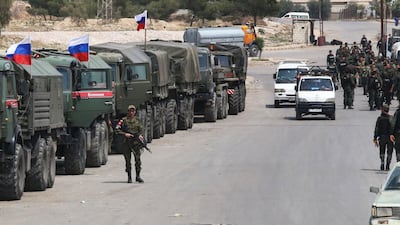While President Vladimir Putin has publicly expressed a desire to reduce Russia’s military presence in Syria, the situation at ground level suggests the opposite, with some observers saying Russia is rapidly supplanting Iran as the main trainer of pro-government forces.
The evacuation of rebel forces and civilians from the eastern suburbs of Damascus was in recent weeks a salient example, with Russian officers negotiating directly with rebel groups and even deploying alongside Syrian military personnel once the rebels had left.
“Everyone knows Russia is in control, not the regime,” said one young man, who was evacuated from the formerly rebel-held suburb of Douma.
He said no one was surprised when an Arabic-speaking Russian soldier boarded the bus that was to take people to rebel-controlled parts of northern Syria in order to check whether the evacuees were carrying anything more than the light weapons they had been permitted.
“People hate Russia as much as they hate the regime,” he said. “But they know Russia is in control, not [Syrian President Bashar] Al Assad.”
The Russian role in negotiating and enforcing the agreement with rebels in Damascus' suburbs underscores a larger ground-level presence across Syria. Russian Defence Minister Sergei Shoigu said in December that 48,000 Russian troops had taken part in Moscow's military campaign in Syria, which began in late 2015.
Those numbers are difficult to verify, but Col Fateh Hassoun, a defected Syrian military officer who now negotiates on behalf of the rebel forces at international peace talks, said he believes those numbers are reasonable.
Col Hassoun said that Russian military personnel are increasingly supplanting Iranian ones in training the Syrian government’s forces, a dynamic he thinks will only increase as Israel becomes increasingly willing to carry out widespread strikes inside Syria to prevent Iran from setting up permanent military installations.
The recent campaign against Ghouta meant the Iranian militias were only partly involved and only "intervened at the level of organising and training the army. For example, the Fifth Corps was created and trained by them [Russian],” he said.
Col Hassoun and others said that the Fifth Corps had been created by Russian military advisers to replace the National Defense Forces, a conglomeration of pro-government militias that was stood up with assistance from Iranian trainers in late 2012.
“The Russians deal with specific leaders in the regime of Bashar al Assad, so that they are loyal to Russia and not to Iran, and support these leaders and sometimes threaten them to control them and thus control decisions within the army,” Col Hassoun said.
_______________
Read more
Russia blames UK for staging 'fake' Syrian chemical attack
Syrian regime flag raised in Douma: Russia military
_______________
In many local ceasefires, the Russian military appears to have taken the Syrian one almost completely out of the equation.
“They’ve also been involved in prisoner releases and exchanges,” said Lama Fakih, deputy director for Human Rights Watch in the Middle East and North Africa.
Still, Ms Fakih said, it is often difficult to determine the actual level of Russian involvement.
“The Russian government hasn’t been transparent about military operations and maneuvers, which makes it difficult to say how categorically they’re involved,” she said. “There has been speculation the Russians were very heavily involved in the bombing campaign in Ghouta, but we’re left to sort of piece it together. The US-led coalition, to take a counterpoint, does publicise when it is involved in strikes or operations in the country, so there is some measure of transparency.”
In eastern Syria, residents of the city of Deir Ezzor also said there was a sizeable presence of Russian troops and military contractors.
“They are there for the protection of oilfields,” said one resident who asked to remain anonymous.
In Tartous on Syria’s Mediterranean coast, where Russia maintains a naval base, residents said that Russian officers’ families have even joined them, living in buildings near the base.
“The Russians rarely interact with civilians. Sometimes they go to the market to buy some stuff, but they don’t speak with anybody,” said a journalist in the coastal city of Tartous who works under the pseudonym Alimar Lazkani.
“The military post in which they exist is guarded by a battalion from the Fourth Division,” Mr Lazkani said, referring to another Russian-created Syrian force. “The regime doesn’t have anything anymore. The Russians are in charge of everything. If the Russians leave, a great chaos will ensue.”
Col Hassoun said such heavy Russian involvement was the price the Syrian government had paid to survive.
“The Russians intervened in a crucial moment when the regime and the Iranians were in their worst time. That is why the Russians posed (enforced) their conditions. Now they control everything,” he said.
Mr Lazkani said Russian military personnel have developed a reputation for trying to implement stricter rules among the Syrian military and the militias that have supplanted it.
“The Russians are trying to implement a strict military system. They broke taboos in the Syrian army and destroyed the prestige of the Syrian officers in front of their soldiers,” Mr Lazkani said.
"If a Syrian colonel is caught by a Russian lieutenant drinking matte (a popular tea-like beverage), he can be punished by the Russian. If a Syrian officer raises his voice over the Russian, most probably he will be beaten up violently," Mr Lazkani said.

